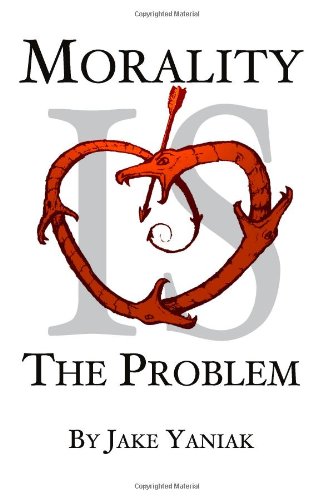by Jake Yaniak
★★★★★
We have the Moral Argument all wrong. Universal morality isn’t evidence of God’s existence, it’s the reason we need God. Human morality is flawed from its foundation, a fiend from whom we need salvation.
Yaniak’s new book is philosophy made interesting, from a Christian perspective. Besides presenting an unusual take on the dilemma of the origins of human morality, he has a style of writing that draws you in and keeps you interested. I thoroughly enjoyed it, though I confess occasional bewilderment. Like any good philosopher, Yaniak spins his web in circles. For example, he rails against the illogic of determinism, then relies heavily on causation from the beginning of the world. In a discussion about Problem of Evil, Yaniak seems to prove that God exists but could not be the God of the Bible. So it takes a bit of concentration to pick out his fine brush strokes, and I’m likely to misrepresent him somewhere in the paragraphs ahead!
In seeking to elucidate God, free will, moralism, and good and evil, Yaniak flirts with both pantheism and materialism, while staying an arm’s length from both. God, for example, is not the apple, nor in the apple, nor encompassing the apple, but is the state of the apple. God is its existence, and a tenuous existence it is indeed, once you follow the logic.
Yaniak’s flirtation with materialism is equally intriguing, especially when he discusses Original Sin. We are not merely born of Adam, we are Adam. This he argues by tracing backward: At what point did I become me? At birth? Conception? Why do we choose these arbitrary benchmarks? I am me while yet I am my father, though in an earlier state. While yet I am my father’s father. I am Adam. I ate the apple in the Garden of Eden.
By ignoring the duality of mind and body, or soul and body, effectively discarding any moment of incarnating “life,” we are all Adam. It doesn’t matter whether we read the story of Adam and Eve literally or figuratively. We are all one, and the implications are astounding. Judgment becomes swift and righteous. When I murder my brother, I am immediately suffering for my wrong, for I am he. Salvation also carries new meaning. Good and evil take on a different light. My relation to my neighbor, and to the fly on the wall, is merely a matter of degree … the ancestry simply traces further back through evolution. Who is to say it is wrong for Hitler to murder Jews while we happily step on cockroaches? We tend to sympathize with one and not the other, letting our sympathies drive our morality, but this is to misunderstand both God and who we are.
Yaniak returns often to the topic of gay rights, probably because it is such a hot topic in Christianity today. His eventual conclusion boils down to a definition of love which seems beneath us, but I confess the topic made for a fascinating moral playground.
In the end, I must rate this as one of the most fun philosophical journeys I’ve taken in many years. You won’t think about life the same after this one.
Self-published, © 2013, 250 pages
ISBN: 978-1-49211-336-2

